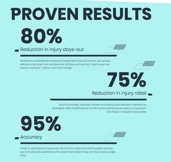What’s a team without its most valued player? Teams all over the globe ask themselves this question each time a player is unexpectedly taken out of the game or season due to injuries. Luckily, technology has drastically revolutionized the way injuries are prevented through the use of Artificial Intelligence (AI) and data collection. Companies like Zone7 have made it their mission to utilize AI in training to determine how to equip an athlete to maintain their best condition.
Injuries
Sports injuries have always been #unpredictable, but with the use of wearable and video technology, injuries can be anticipated and ultimately prevented. For example, injuries like concussions have been the center or conversation for some time now and utilizing this new industry of tech can prevent unfortunate incidences like Rob Gronkowski’s.
In this instance, Artificial Intelligence allows for constant monitoring to ensure concussions can be prevented and treated if they are to happen. This not only eliminates a burden off of the athlete’s shoulders, but the coaches, sponsors, and trainers as well.
Does it Work?
These Artificial Intelligence companies prevent injuries in three steps (Predict):
- Collecting data through the technology used in training
- Identifying each athlete’s injury risk through pattern recognition
- Recommending modifications on the field by coaches, trainers, and doctors in addition to workload and drill changes to reduce risk

While these claims sound promising, are they? Taking a look at the graphic below, #Zone7 is confident in their services. Boasting an 80% reduction in injury days-out allows the athlete to perform at their best while maintaining their health for the future (Predict). For the athlete, this provides more playing time and getting to do what they love. For trainers and doctors, this alleviates the burden of constantly reviewing data on every player every day of the week (Lewanczik, 2019).
In step, Zone7 reduces the overall injury rate by 75%. The data connected with the technology is able to gauge when an athlete has hit their limit and may be on the verge of an injury. This allows for everyone on the training team to accommodate the situation for the performance of the athlete to continue to progress. Clearly Zone7 is doing something right as the 95% accuracy rate boasts. While some clubs and sponsors may question the added expense to an already costly industry, the AI programs pay for themselves. The success rate allows for players to fulfill their contracts thus, drawing in fans to fill stadiums to the sponsors content. So, how are these companies protecting the data from getting into the competition’s hands?
Can the Data be #Hacked?
CEO of Zone7, Tal Brown, reassured the public of the company’s healthcare grade security (Lewanczik). Artificial Intelligence databases like these are special in that athletes or the customer owns their data and can control how it is available. Brown has set up the infrastructure to data security and ensures precautions are taken to maintain the information in the cloud (Lewanczik). While the fear of a security breach is possible, it is clear the database CEO is confident in the client’s secure wellbeing.
From an outsider’s perspective, I believe Artificial Intelligence will immeasurably make the world of sports safer and more enjoyable. Not only will fans be able to see their favorite players on the field more, but athlete’s will be able to have a longer more fulfilling career. While some fans have speculated AI will make the sports world more predictable, Tal Brown says: “The human brain, operating in high-speed, reacting to a thousand changing factors in a game that are detected through eyes and ears is and will always remain unpredictable.” I believe the unpredictability will always remain, but now there’s a safety net when it does. Fans will still be able to experience any sporting event to its full capacity like before, but can hold more confidence in their team. Artificial Intelligence provides the insurance needed when the unthinkable happens.
Joy Cain is a senior Marketing major with an Art minor. After she graduates from Samford University, she hopes to work for a marketing firm and have a gainful career in branding.
Citations
- Lewanczik, N. (2019, May 28). Zone7: Time to Prevent Injuries with AI and Big Data. Retrieved from https://spielmacher.io/2019/05/23/zone7-time-to-prevent-injuries-with-ai-and-big-data/
- Predict Athlete Injuries. (0AD). Retrieved from http://zone7.ai/#
